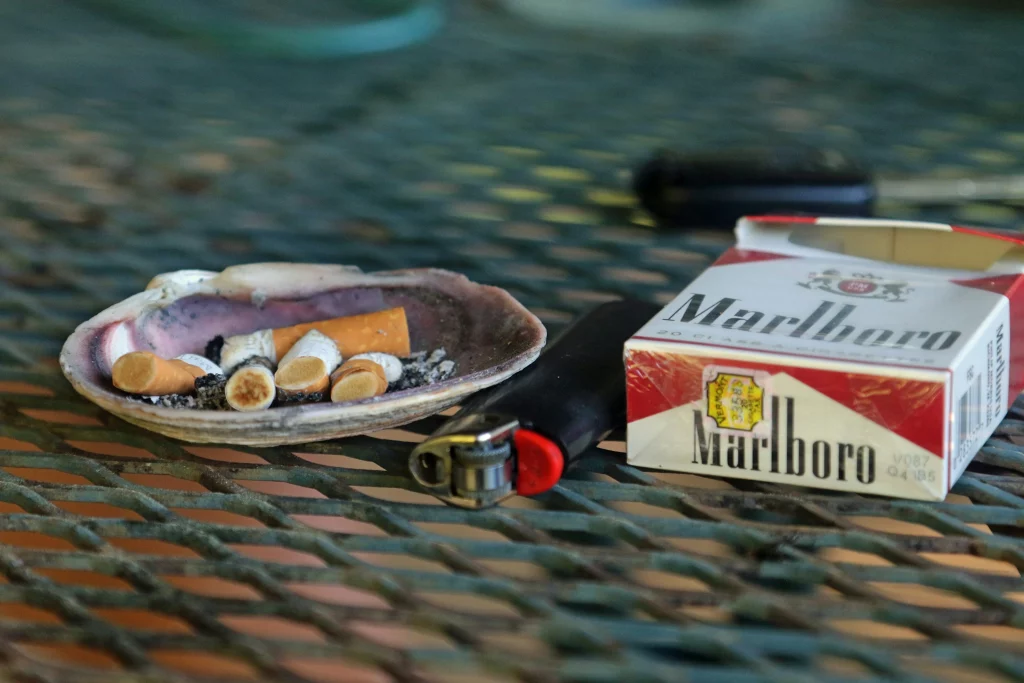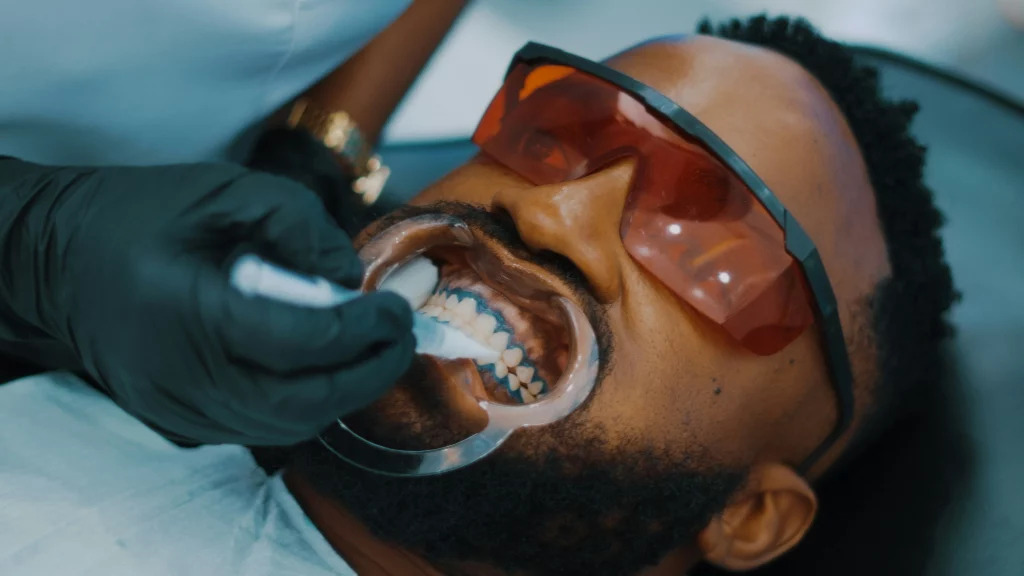Teeth whitening can be a game-changer for smokers who want to restore a bright, healthy-looking smile. Years of tobacco use often leave behind stubborn stains that regular brushing can’t remove. Whether you’re a current or former smoker, you don’t have to settle for dull or yellow teeth. With professional teeth whitening treatments and good oral habits, you can dramatically improve the color of your smile. In this article, we’ll explore how smoking affects your teeth, which teeth whitening options work best, and how to maintain your results long-term.
How Smoking Affects Tooth Color and Oral Health

The situation with regard to teeth whitening becomes even more problematic when one adds smoking to the situation- nicotine, tar, and smoke stains are stubborn with their yellow/brown color. Such stains are not superficial because they infuse and enter enamel during the years, and this is why basic whitening systems do not work well.
Chronic tobacco chewing is also known to cause irritation of the gum, decreased saliva flow and increase susceptibility of periodontal disease – factors which retrogresses the whitening process. Healthy smile begins with not only clean teeth but also with the supportive mouth.
Types of Stains Caused by Smoking and Vaping
Surface stains caused by tobacco are extrinsic: at first, it is simply stain on surface, but after repeated exposure it becomes intrinsic and is embedded in enamel. Vaping is also associated with the same or worse dangers because they emit nicotine and chemicals related to heat that facilitate the accumulation of stains.
Compared to coffee, or tea, these stains will vary in their depth and intensity and they may be darker and immune to DIY treatments.
Why Smokers Are More Prone to Yellow and Brown Teeth
In addition to direct staining, smoking is associated with impaired circulation of blood to gums and messing with the cleaning functions of saliva. The shortage of saliva will deprive the mouth of natural stain cleaning and will allow stains to spend more time on enamels.
The acidic smoke causes the depletion of minerals which further weaken enamel affecting the enamel to become more porous thus prone to pigmentation caused by byproducts of tobacco.
Other Oral Issues Related to Long-Term Tobacco Use
Often, smokers experience dry mouth, gum recession, the increased chances of getting cavities, and even diminished taste. These disorders compromise oral hygiene; they make teeth whitening problematic and lead to a higher possibility of post treatment sensitivity. Moreover, nicotine and tar diffuse deep in enamel and the result is that stains become resistant to over-the-counter products. This is one of the reasons why professional teeth whitening may very well seem to be the best and safest option to smoke-addicted people who want to achieve actual outcomes.
Teeth Whitening Options for Smokers

That is why effective whitening requires procedures that are able to deal with deep stains. Mild advancements can come in the form of over-the-counter products which in the case of long-term smokers are usually ineffective. The teeth whitening products done by professions, however use stronger agents which can penetrate beneath the enamel surface. The following is a yes/no list on what works best.
Professional Whitening vs. At-Home Treatments
Professional whitening involves the concentrated gels of peroxide under direct supervision and research indicates that they yield more powerful results than those of consumer products. In persons who smoke, a deeper staining might need a higher treatment.
At-home kits are good overall, although they do not always cover tobacco pigmentation well. Nevertheless, they may be helpful in terms of maintenance between visitation by professionals.
Laser Teeth Whitening for Stubborn Tobacco Stains
Laser-driven teeth whitening enhances the strength of bleaching since laser-driven whitening lets the powerful agent in deeper on the enamel. The practice would largely be of benefit to smokers due to its ability to reduce stubborn, tobacco induced stain by a number of shades in a single session, especially. Although this procedure is normally safe, after the procedure, certain patients might feel slight sensitivity in their teeth. One should use desensitizing toothpaste just before and after to control any pain.
Whitening Toothpastes and Mouthwashes: Do They Help Smokers?
Whitening toothpastes contain weak abrasives and low concentration bleaching agents. They are able to clean up on the superficial stain of smoking, but not able to get out deeper discoloration . Toothpaste and mouthwash are the most effective to use as an auxiliary resource-keeping the teeth white in the event of deeper procedures.
Best Practices for Maintaining Teeth Whitening Results as a Smoker
It requires more attention and dedication of a smoker to uphold the results of teeth whitening. Limit the tobacco consumption also as much as possible- reducing even by a small amount will minimize new stain accumulation.
This should involve practicing excellent oral hygiene such as brushing two times a day using a teeth whitening toothpaste and flossing to make sure that plaques that trap particles that stain the teeth are eliminated. Brush, or rinse your mouth after every cigarette or chew sugar-free gum to trigger your saliva and counter acids. Frequent dental checkups and minor touch up whitening of the teeth once in a few months will also aid in maintaining your smile white.
How to Minimize Stain Reappearance
In order to save the effect of your whitening, you need to put off smoking at least 24 hours after treatment- at least the enamel will have time to rehydrate and close up. In case you know you might smoke, clean your mouth or brush your teeth so as to prevent maximum exposure to pigment. It is also important to be well-hydrated because saliva cleans the mouth and removing particles that will cause stains.
Diet and Oral Care Tips for Tobacco Users
In order to always have a nice bright smile, consume coffee, tea, and other dark liquid beverages through a straw- this minimizes their interaction with your teeth and you will end up having less stains on your teeth. Use a soft-bristled toothbrush to brush regularly and keep your enamel intact and appear white at the surface. Introducing a mouthwash that is free of alcohol, to daily routine will be a perfect addition to getting rid of remaining pigments and maintaining a new, healthy mouth over all.
Smoking Alternatives That May Be Less Staining
Use of nicotine gum, patches, or even the e-cigarettes can still put nicotine on your teeth, but these substitutes usually avoid tar- the main contributor of stubborn teeth stains. Although these solutions may make the appearance of discoloration to be less harsh, the best way of ensuring that the smile in your face is improved is simply to cut back or eschew tobacco applications completely.
Teeth Whitening Safety for Smokers with Sensitive Teeth
When you have sensitive teeth and smoke, then the process becomes somewhat more complicated, yet it can still happen with a proper strategy. Smoking damages enamel and annoys gums already and during or after teeth whitening procedures this may aggravate sensitivity. To reduce any pain limit or avoid using the harsh teeth whitening products such as strong gels of peroxide or seek the supervision of a dentist in take home trays.
Make it a point to always ask your dentist about issues concerning any type of treatment you want to make sure that he or she can tell you what products to avoid that might enhance sensitivity or even make what is already wrong to become such. The process can also be easier and safer by usage of sensitivity-reducing toothpaste before and after whitening, and by a difference in time between the treatments.
Teeth Whitening Side Effects for Smokers
Post-whitening sensitivity occurs frequently, 67–78% experience it after in-office treatments. For smokers, existing enamel thinning makes this discomfort more likely.
How to Choose Products That Protect Gums and Enamel
Search systems that have fluoride or potassium nitrate additions of professional grade. The barriers and gels must be used to offer a protective cover to the gums under laser treatment. The dentist can prescribe treatments to reduce irritation and avoid the damage of enamel.
Teeth Whitening Frequency Guidelines for Tobacco Users
Professional stains may take more than one appointment to achieve the brightness level that one desires. Touch up after the initiatory period after every 6 months or as instructed. Spacing treatments enable enamel to recover as over-whitening may hurt it.
Frequently Asked Questions (FAQs)
1. Can teeth whitening remove deep tobacco stains?
Yes, especially professional teeth whitening and laser treatments. While over-the-counter products can help with surface stains, they often fall short for long-term smokers dealing with deep discoloration. Professional treatments use stronger bleaching agents that penetrate the enamel more effectively, lifting years of pigment in just one or two sessions. Laser-activated whitening, in particular, can accelerate results and deliver dramatic improvements quickly. However, it’s important to consult with your dentist first, especially if you have sensitivity or gum issues. With expert care, smokers can achieve noticeable whitening results safely and efficiently.
2. Is laser whitening safe for heavy smokers?
Laser whitening is safe when performed by trained professionals who understand how to minimize risks. For smokers, this method can be especially effective in breaking down stubborn stains caused by nicotine and tar. While some individuals may experience temporary sensitivity after treatment, this usually subsides within a day or two. Using desensitizing toothpaste beforehand and avoiding very hot or cold foods afterward can help ease any discomfort. Dentists may also apply protective gels or recommend specific aftercare products to further reduce sensitivity. Overall, with proper care, laser whitening is a reliable and effective option for smokers seeking a brighter smile.
3. How often should smokers get their teeth professionally whitened?
Scheduling maintenance visits every 6–12 months helps retain whitening results and catch any early signs of staining. For smokers, more frequent touch-ups about every 6 months may be necessary due to continued exposure to nicotine and tar. These regular visits allow your dentist to monitor enamel health and adjust your whitening plan as needed. Professional cleanings during these appointments also remove surface stains before they set in. Sticking to this routine not only maintains brightness but also supports better oral health overall.
4. Are whitening strips effective for smokers?
Whitening strips offer gradual brightening and can be effective for mild surface stains, but they often fall short when tackling stubborn tobacco discoloration. The chemicals in over-the-counter strips aren’t strong enough to deeply penetrate enamel that’s been affected by years of smoking. While convenient, their results are typically subtle and take longer to appear. Strips work best when used as a maintenance tool following professional whitening treatments. They help extend the brightness of your smile but shouldn’t be relied on as the sole method for whitening heavily stained teeth.
5. Can I whiten my teeth while still smoking?
Yes, teeth whitening can still be effective for smokers, though continued smoking will inevitably dull results and shorten their lifespan. Nicotine and tar quickly restain enamel, making it harder to maintain a bright smile. Quitting or even reducing smoking significantly enhances the longevity of whitening outcomes. It also improves overall oral health, reducing risks of gum disease, bad breath, and tooth loss. The fewer staining agents you’re exposed to, the more lasting and noticeable your whitening results will be.
If you’re a smoker ready to refresh your smile and regain that bright glow, a customized whitening plan makes all the difference. Combining professional treatments, maintenance routines, and targeted lifestyle changes empowers lasting transformation.
Book your consultation today to receive tailored advice and explore advanced whitening options—from laser sessions to custom home trays. Your brighter smile is within reach. Let’s take the journey together.


